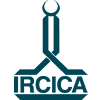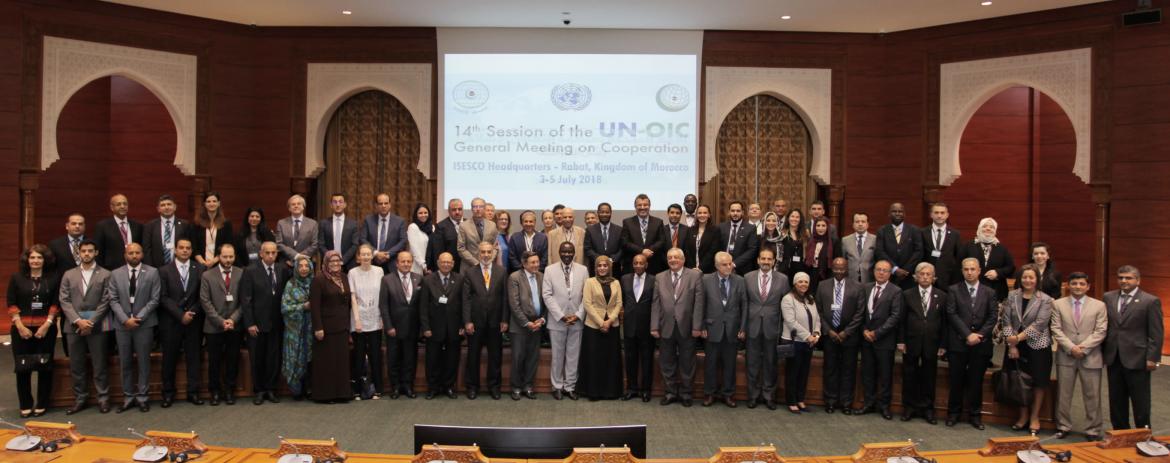Pursuant to the United Nations General Assembly Resolution A/RES/72/74 of 6 December 2017, the 14th General Meeting on Cooperation between the Secretariats of United Nations (UN) and the Organization of Islamic Cooperation (OIC) and their specialized organizations and agencies took place in Rabat, Morocco on 3-5- July 2018. The meeting was hosted by Islamic Educational, Scientific and Cultural Organization (ISESCO) in Rabat.
Opening session heard the official statements of H.E. Dr. Abdulaziz Othman Altwaijri, Director General of ISESCO, delivered by Dr. Amina Al-Hajri, Deputy Director General of ISESCO; H.E. Amb. Hameed Opeleyru, Assistant Secretary General for Economic Affairs of the OIC; and H.E. Mr. Taye-Brook Zerihoun, Assistant Secretary General for Political Affairs in the UN. Mr. Rashid Khalidov, OCHA Assistant Secretary-General for Humanitarian Partnerships with the Middle East and Central Asia, and H.E. Ambassador Aghsin Mehdiyev, OIC Permanent Observer to the United Nations attended the opening of the event.
Subsequent to the opening session, the plenary session heard the review of cooperation and appraisal of progress achieved since the UN-OIC General Meeting on Cooperation in Geneva in May 2016. Following the review, UN and OIC agencies made their statements. The OIC was represented by the OIC General Secretariat, OIC Permanent Observer to the UN Office in Geneva, Statistical, Economic and Social Research & Training Centre for Islamic Countries (SESRIC), Islamic Centre for Development of Trade (ICDT), OIC Islamic Research Centre for Islamic History, Art and Culture (IRCICA), Secretariat of the Independent Permanent Human Rights Commission (IPHRC), Islamic Educational, Scientific and Cultural Organization (ISESCO), Islamic Chamber of Commerce, Industry and Agriculture (ICCIA), Standards and Metrology Institute for the Islamic Countries (SMIIC), Islamic Committee of the International Crescent (ICIC), Islamic Conference Youth Forum for Dialogue and Cooperation (ICYF-DC), Committee on Scientific and Technological Cooperation (COMSTECH), Committee for Information and Cultural Affairs (COMIAC), Committee for Economic and Commercial Cooperation (COMCEC) Coordination Office, Islamic Solidarity Sports Federation (ISSF), Al Quds Committee (BMAQ). United Nations was represented by the Department of Political Affairs (DPA), Food and Agriculture Organization (FAO), International Organization for Migration (IOM), International Telecommunication Union (ITU), Office for the Coordination of Humanitarian Affairs (OCHA), Office of the High Commissioner for Human Rights (OHCHR), Office of the United Nations High Commissioner for Refugees (UNHCR), United Nations Children’s Fund (UNICEF), United Nations Department of Public Information (UNIC), United Nations Educational, Scientific and Cultural Organization (UNESCO), United Nations Entity for Gender Equality and the Empowerment of Women (UN Women), United Nations Environment Programme (UNEP), United Nations Institute for Training and Research (UNITAR), United Nations Office on Drugs and Crime (UNODC), United Nations Register of Damage Caused by the Construction of the Wall in the Occupied Palestinian Territory (UNRoD), United Nations Relief and Works Agency for Palestine Refugees in the Near East (UNRWA), World Food Programme (WFP), World Health Organization (WHO), World Intellectual Property Organization (WIPO).
Representatives of the following organizations addressed the plenary session: OCHA, SESRIC, UNRWA, ICDT, WFP, IRCICA, UNODC, ICCIA, WIPO, IPHRC, UNICEF, COMCEC, AL Quds Committee and OHCHR. IRCICA representative Mr. Nazih Maarouf addressed the audience with a detailed review of present state of IRCICA’s activities within the context of UN-OIC cooperation with a focus on the priority area entitled “Development of Arts and Crafts and Promotion of Heritage”.
Subsequent to the plenary session, consultant to the Director General of IRCICA on Crafts Development Program at IRCICA, Dr. Nazih Maarouf held a bilateral discussion with the Mr. Philippe Maalouf, Specialist of Education at UNESCO. Bilateral discussion provided a fruitful exchange of ideas and served as a basis for new prospective co-developments. The two representatives exchanged ideas about the prospective cooperation between the parties and reiterated their commitment to deepening bilateral cooperation in cultural matters including the education of youth, creating awareness and promoting the importance of traditional handcrafts.
Following the plenary session, the first day of the 14th General Meeting saw the working group sessions. The groups of experts held discussions around specific subject areas and IRCICA participated in the working group on social and cultural issues. Representatives of relevant institutions participated in the working group where the 2016 Matrix was reviewed. On the second day of meeting, the working group on social and cultural issues focused on the modification and implementation of the matrix in light of the discussions and suggestions. The Working Group also discussed ways to improve the Matrix, in order to better organize information about implementation.
Accordingly, the working group on social and cultural issues agreed on the following points:
– The meeting agreed on additional suggested areas of cooperation from OIC General Secretariat relevant to the protection of women from violence, media and public information through identifying and subsequent execution of joint activities in these areas.
– OIC General Secretariat suggested to add areas of cooperation in the field of cultural heritage, specifically on establishment of the OIC Platform for Cultural Heritage.
– The meeting noted the importance of developing a Trust Fund for implementing the cooperation projects between the OIC and the UN and suggesting methods of administering this trust fund.
– It was noted to improve engagement between relevant OIC and UN institutions in the area of immigration and youth. In addition, to develop social areas of cooperation relevant to welfare of elderly and people with special needs.
– Participants shared the view to include ISESCO in all activities related to Cultural Heritage.
– It was agreed to develop or execute a special competition or contest for Al-Quds in order to demonstrate the Islamic Cultural Heritage and the inter-civilization and intercultural values of Al-Quds.
– Both the UN and the OIC agreed to cooperate in the establishment of the OIC Grand Prize for Film Production and programmes relevant to this issue.
– The meeting welcomed cooperation with the UN in the initiation and operation of the OIC Platform for Protecting and Preserving Cultural Heritage.
– Participants shared the view to create a Voluntary Trust Fund to execute the activities relevant to human rights issues between the OIC and the UN. This fund could benefit from all stakeholders interested in human rights including the private sector.
– Regarding the format of the meeting, it was suggested to review, assess and update the matrix annually, instead of reviewing it every two years as well as to design a more practical template for the progress report with a timeframe or ongoing progress for each item.
– Participants suggested to include the international universities’ unions and the Federation of the Universities of the Islamic World (FUIW) in the matrix activities.
14th session of UN-OIC Coordination Meeting concluded with adoption of matrix and final report, on 5 July 2018. The closing session heard the addresses of the Director General of the Islamic Educational, Scientific and Cultural Organization (ISESCO), Dr Abdulaziz Othman Altwaijri, Ambassador Hameed Opeloyeru OIC, Assistant Secretary General for Economic Affairs, and Mr Tayé-Brook Zerihoun, UN Assistant Secretary-General for Political Affairs. The participants adopted the Meeting’s Final Report which contained several recommendations on promoting cooperation and coordination in the issues related to Palestine and Al-Quds Al-Sharif, Republic of Mali, the Sahel, Somalia, Central African Republic, Libya, Yemen, Syria, Iraq, Myanmar and Afghanistan. The Meeting also adopted a number of recommendations on electoral partnership; counter-terrorism and prevention of violent extremism; human rights and rules of law; conflict prevention and peace building processes; democracy and good governance; economic, scientific, cultural, environmental, social and humanitarian affairs; and South-South cooperation.







